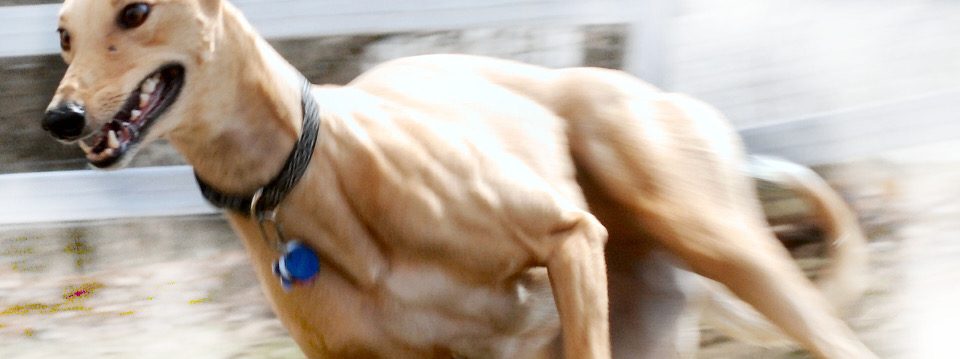Health Issues
When do you have an absolute emergency or can you just wait and see? If you are unsure of the severity of your dogs illness, it is better to contact your veterinarian or emergency clinic. When to call immediately:
- Suspected poisoning
- Signs of gastrointestinal or urinary stress (straining with no success or bloody urine)
- Bloat (the abdomen is large, attempts to vomit, but nothing comes up)
- Choking or coughing continuously
- Uncontrolled vomiting or blood in vomit
- Diarrhea with blood or has a black tarry stool
- Sudden severe lethargy or depression
- Seizure
- Head tilt (eyes moving from side-to-side)
- Difficulty breathing, breathing fast
- Sudden change in behavior
- Crying out when touched
- Rash, excessive shedding, head shaking, persistent scratching or chewing, large hives, and/or facial swelling
- Bloody discharge from the eyes, ears, or nose
Info supplied by: www.PetEducation.com
While greyhounds are typically a healthy breed, some more common conditions that may appear are:
- Osteosarcoma (Bone Cancer) – Latest statistics in 2007 are 1 in 10 will develop it or more.
- Hypothyroidism – symptoms are weight gain despite decreased appetite, having decreased energy, skin issues, and hair loss. Treatment is inexpensive and in pill form.
- Kidney disease – The greyhound’s creatinine level is normally slightly higher than other breeds, additional tests may be necessary.
- Corns – These are very painful causing a severe limp. Very treatable.
- Pannus – Chronic inflammation of the cornea. Symptoms are red eyes, cloudy cornea and vision loss. Without treatment it can lead to irreversible blindness.
- High Blood Pressure (hypertension) – Hypertension in dogs frequently has no symptoms but can cause serious health issues. Canine blood pressure monitoring requires specialized equipment and methods performed by a vet.
Toxins to Greyhounds
Greyhounds have unique metabolisms and physiology that can make even innocuous items deadly, such as a cat toy, sock, or piece of plastic. They can be more sensitive to toxins that other breeds. Potential poisoning is traumatic and unpredictable. Do not hesitate to call your vet or a veterinary emergency clinic in the event you even think your greyhounds may have ingested something inappropriate.
Some common and potentially dangerous foods and human products (this isn’t a complete list):
- Avocado (contain cyanogenic glycosides causing cyanide poisoning)
- Chocolate (reactions can vary from no reaction to death. Reactions can be based on a number of factors rending them unpredictable)
- Alcoholic beverages
Yeast dough/unleavened bread (intestinal distress or alcohol toxicity from yeast fermentation) - Coffee, coffee beans & tea (caffeine)
- Fatty foods (pancreatitis)
- Raisins and grapes (vomiting and digestive distress and kidney failure)
- Hops (used in home brewing – malignant hypothermia)
- Macadamia Nuts (causes weakness, depression, vomiting, tremors and hyperthermia (elevated temperature) within 12 hours of ingestion and can last from 12 to 48 hours.
- Salt
- Xylitol (found in sugar-free sweetened products)
- Cigarettes, tobacco, cigars(nicotine poisoning)
- Onions and Garlic: Small amounts are usually not problematic. Signs of poisoning are gastroenteritis (stomach) with vomiting and diarrhea and breathlessness, sometime a few days after the ingestion.
Useful links for additional Greyhound Health Information
Want to know the best places to go for research about greyhound health? Mark these in your “Favorites List”!
Dr. Guillermo Couto, a leading greyhound veterinarian has implemented a fantastic program dedicated to greyhounds called The Greyhound Health and Wellness Program. To learn more, go to: http://coutovetconsultants.com/
http://www.greyhoundadoptionofoh.org/Greyhound_Health_Packet_08.pdf. Greyhound Medical Idiosyncrasies made available through Greyhound Adoption of Ohio, Inc. by William E. Freeman III, DVM www.greythealth.com Dr. Suzanne Stack’s most requested articles about greyhound health.
www.avma.org/ American veterinary Medical Association provides comprehensive information on pet care, animal health, and veterinary medicine.
Greyhounds with Corns, a private Facebook group that helps diagnose corns and provides extensive information on how to trat them yourself. You must request acceptance into the group.

